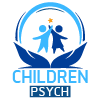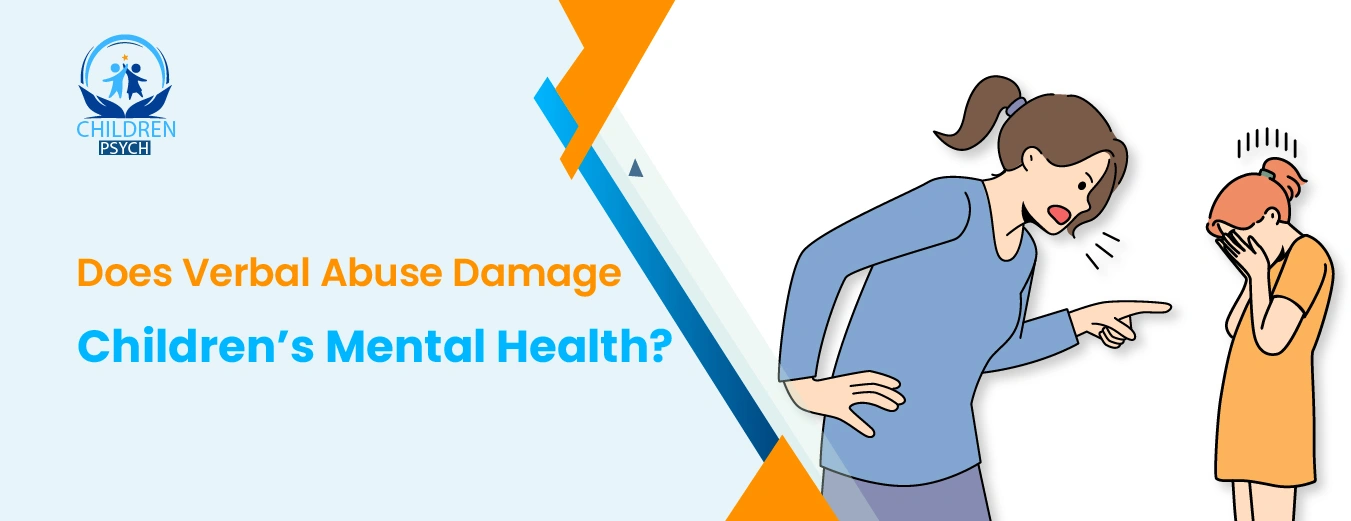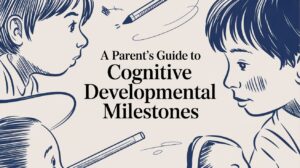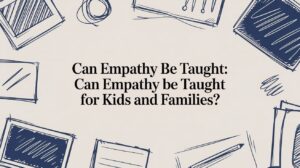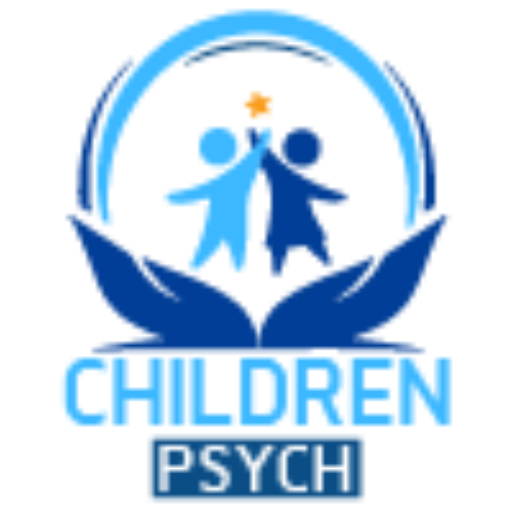If you want to know what verbal abuse is and how it affects children’s mental health, then read this article. You will also understand how it affects each aspect of emotional and psychological health of children and what the top ways are that parents can use to prevent verbal abuse and their damaging effects on mental health. So read now!
Childhood Verbal Abuse can exert long-term Mental Health Consequences
Verbal abuse is a type of psychological or emotional abuse that most parents use on their children. They think that they are just criticizing their children for their benefit, but in reality, their verbal abuse exerts a strong negative impact on their mental health and overall well-being.
Children are categorized as most vulnerable among others and therefore are the major influenced by verbal abuse from their parents, seniors, or caregivers. Not every parent does this, as some make their child suffer from verbal abuse throughout their childhood, while some parents, on the other hand, do not even yell or shout at their children during their entire stage of parenthood. Verbal abuse of parents occurs in different forms, such as threatening, humiliating, shouting, psychological control, and name calling, and each has a strong negative influence on the child’s mental health, which can also last forever if not prevented on time.
Using abusive language in front of the children to try to control them or force them to do anything comes under verbal abuse, and this can result in major consequences for the child’s emotional and mental health.
Parents think that only physical abuse is damaging, but even if they yell or shout at their children, this can be as harmful as physical abuse.
Verbal abuse can result in major mental health issues
Those children whose parents always engage in verbal abuse in front of them are among those who face difficulties in different areas of life, such as school, home, social life, and relationships. If parents do not avoid verbal abuse and always hurt them emotionally or mentally, even unintentionally, then they can become more prone to suffer from several mental health issues.
Several studies have reported that if children experience verbal abuse in their early stages of growth and development, then it can persist into adulthood, and they can suffer from anxiety, depression, alcohol or substance abuse, or some other common mental health issues.
Shouting is not always verbal abuse
Verbal abuse doesn’t always need to include shouting, as some adults or seniors try to abuse the children without yelling, shouting, or raising their voices. But their silent gossip or aggressive behaviors are also damaging to the mental health of children.
Common Signs of Verbal Abuse
The following are the major signs that indicate that the parent or caregiver is engaged in verbal abuse:
- Constant or high level of criticism
- Placing demands in front of children based on impossible expectations
- Making a child an object or witness to domestic violence
- Considering the child as the main battleground to resolve marital conflicts or issues
The psychological and emotional impact of verbal abuse on a child’s mental health
Verbal abuse can disrupt the psychological and emotional balance of children in different ways, which are as follows:
Low confidence & self-esteem:
If parents, seniors, or caregivers most often verbally abuse the children and make them feel less capable, less worthy, humiliated, or asked, then it can lower their confidence and self-esteem. Children feel that they can not do anything in their lives. Due to their stress or fear, they also try to spend most of the time alone and also avoid trying new things or participating in any activity.
Emotional dysregulation:
Children who are repeatedly exposed to verbal abuse face difficulty in identifying their emotions and then expressing them in front of others. Moreover, they also have reduced control over their emotions and thoughts. This is why you might have noticed that children who have always been subjected to verbal abuse exhibit more anger outbursts than others.
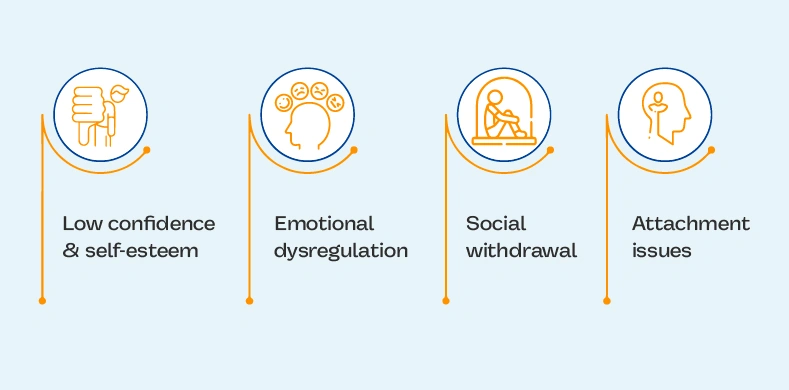
Social withdrawal:
Due to verbal abuse, children consider themselves less worthy and therefore try to avoid social gatherings or meetings. They also try to avoid sharing their thoughts, opinions, or ideas with others due to lower self-esteem.
Attachment issues:
Most of the children also show a clingy nature and make their effort to stay close to their loved ones, even if they do verbal abuse. They feel an extra desire to get love and acceptance instead of getting repeated rejection from them. Therefore, they waste their precious time in unhealthy or toxic attachments or relationships. Moreover, they also face major trust issues in any new relationship in the future. But their clingy nature always puts them in trouble in developing and maintaining a strong, healthy, and productive bond with their loved ones.
Anxiety, Depression & Other Common Mental Health Issues
High rate of verbal abuse in children is linked with the increasing rate of occurrence of anxiety, depression, post-traumatic stress disorder, and other common and major mental health issues. Due to mental health issues, children fail to achieve excellence in each phase of their lives.
Negative effects on development and cognitive abilities
Academic issues
Verbal abuse is one of the major reasons for stress or anxiety in children, which in turn affects their brain growth and development. Moreover, their cognitive functioning is also disturbed to a major extent. Therefore, they face difficulty in learning and remembering new things. Likewise, they do not easily pay attention or pay attention in the classroom. This, in turn, ultimately affects their academic performance.
Speech and language issues
As verbal abuse comprises insults, humiliation, etc so the children who suffer from this issue exhibit more language and speech-related issues. For example, they have poor vocabularies, immature grammar skills, and also face difficulty in correctly pronouncing different words or terms.
Negative changes in behavior
Excessive verbal abuse also led the children to show negative behavior, which included
- Bullying
- Aggressive behavior
- Participation in risky activities
- Self-harm or harming others
What are the major long-term consequences of verbal abuse on children’s mental health?
The long-term negative effects of verbal abuse on a child’s mental health include:
Negative adult relationships
Those individuals whose childhood was dark due to verbal abuse do not easily make new relationships. They do not trust others and always doubt others instead of getting into intimacy. Even when someone tries to come close to them, they consider it negative and feel that the other person is trying to abuse them or wants to get some benefit from them without knowing the reality.
Substance abuse
Children who have suffered verbal abuse also get addicted to alcohol or substance abuse. This, in turn, also increases their anxiety or depression.
Abusive behavior towards others
Verbal abuse is another major cause of the abusive nature of many children towards their family, friends, or loved ones. They do not listen to or understand others and always try to impose their own decision or opinion on them.
Poor mental resilience
Children who have experienced verbal abuse usually cannot cope with the stress and navigate all the life challenges. So, verbal abuse makes the child less mentally resilient to battle life challenges.
What are the ways to prevent verbal abuse and its negative impact on a child’s mental health?
By the help of the following ways, parents can prevent the verbal abuse and their drastic effects on mental health:
Immediately distance yourself
Whenever you feel that you are becoming angry or feel frustrated then immediately take a break and step away from your child instead of losing your temper over them. First, try to calm yourself and then talk with your child. Likewise, another way that can help you restore your mental calmness is closing your eyes, practicing deep breathing, or starting to count, etc.
Set a routine for your child
By making a structured or organized routine schedule for your child, you can help them live the best quality of life. Instead of getting into arguments, you instruct them to perform all the tasks of the day with attention. In this way, they participate in all healthy, productive activities, and you also prevent yourself from verbal abuse.
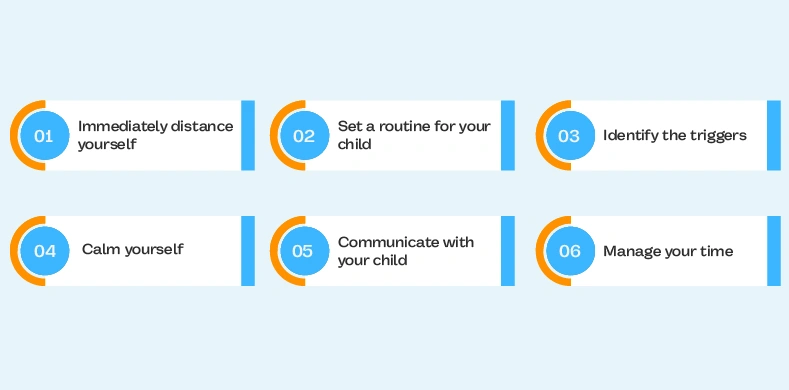
Identify the triggers
There is always a trigger behind every action of verbal abuse. So always try to identify first what triggers you to start verbal abuse in front of your child. After the identification, employ the ways that can help you prevent verbal abuse.
Calm yourself
Your priority should be your mental peace. Whenever you feel that you are becoming angry or frustrated, immediately try to calm yourself so you never do the verbal abuse.
Communicate with your child
Encourage open communication with your children. Develop a safe and friendly environment so your child can speak and share their mental issues without any fear. Instead of using abusive language in front of them, listen to them with attention.
Manage your time
Excessive stress becomes a major trigger factor for verbal abuse. So the best way to deal with this issue is to manage time appropriately to prevent stress, frustration, and ultimately verbal abuse.
Be a role model for your children
Children always follow their parents, so whatever you do, your children will always mimic you. So always try to have control of your mind and never allow yourself to do verbal abuse.
Final thoughts
Verbal abuse can cause long-term damage to the mental well-being of children. If parents, seniors, and caregivers always threaten their child and use those words or phrases that humiliate them or make them feel embarrassed, then they are more likely to suffer from mental health issues such as anxiety, depression. The constant phase of verbal abuse can damage the emotional and psychological state of children. However, parents can prevent this by employing several useful strategies and can protect their child’s mental health and overall well-being.
Nurture your Child’s mental health at Children’s Psych
Children’s Psych is a leading platform where you can get the top psychiatric services for children and adolescents. We want to empower the mental health of each child so they get rid of their common mental health issues and take every step towards joy in life. We never want you to leave your child with hidden mental scars, as we are here to heal them.
We have a team of compassionate and skilled child psychiatric nurse practitioners who develop individualized mental health treatment plans that tailor to the distinct needs of each child or teen. They first identify the root cause of each mental issue and then develop tailored therapeutic strategies.
We also offer the telehealth service for those who are unable to attend the physical and mental health appointments for their children. So, without any physical commute, you can join the virtual sessions and get the best treatment plans for your children and adolescents.
So if you want to unlock your child’s mental potential, then book a consultation with our experts today.
Frequently Asked Questions
Can verbal abuse cause mental health issues?
Yes, continuous verbal abuse can have a strong negative effect on mental health and can lead to common mental health issues such as anxiety, depression, etc.
What are the 7 common signs of emotional abuse?
The 7 main signs of emotional abuse include:
Controlling behavior
Manipulative behavior
Continuous criticism
Humiliating behavior
Isolation from support systems
Gaslighting
Jealousy and possessiveness
Can verbal abuse cause personality disorders?
Yes, verbal abuse can also cause the development of personality disorders, which include:
Obsessive-compulsive personality disorder
Borderline personality disorder
Narcissistic personality disorder
How does verbal abuse cause social anxiety?
Verbal abuse makes the children less confident, and therefore, they consider themselves less worthy and always prefer to stay alone
